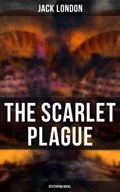In Jack London's dystopian novel "The Scarlet Plague," the narrative follows the journey of an aged professor who recalls the devastating effects of a mysterious pandemic that wiped out civilization. London's succinct yet powerful prose sets a bleak tone, depicting a world devoid of order and societal structures. This post-apocalyptic tale explores themes of human resilience, mortality, and the fragility of civilization. Set in the future, London's novel serves as a cautionary tale about the consequences of unchecked hubris and the importance of humility and cooperation in the face of adversity. London's literary style is straightforward yet evocative, painting a vivid picture of a decaying world. The book's dystopian setting is reminiscent of other classic works in the genre, but London's focus on the human experience sets it apart from similar narratives. Jack London, known for his adventurous spirit and exploration of the natural world, brings a sense of realism to his dystopian vision, drawing from his own experiences to craft a compelling narrative. Readers who enjoy thought-provoking dystopian literature that delves into the complexities of human nature will find London's "The Scarlet Plague" a compelling and poignant read.

